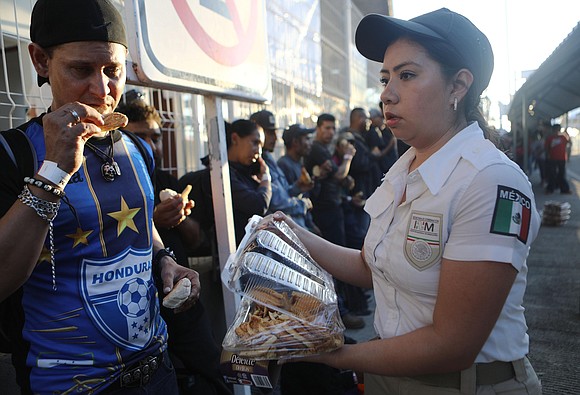US immigration authorities detail so-called return-to-Mexico guidance for migrants
CNN/Stylemagazine.com Newswire | 1/28/2019, 6:18 p.m.

By Geneva Sands and Priscilla Alvarez, CNN
(CNN) -- The Trump administration officially laid out its new policy to force migrants seeking asylum in the United States to remain Mexico to await their immigration court proceedings -- a significant change in US asylum policy.
The memorandum, which was issued by US Citizenship and Immigration Services, would require some asylum seekers, many of whom are from Central America, to stay in Mexico, instead of the US, until their immigration court hearings. A massive immigration court backlog has resulted in cases being scheduled years out; it's not clear whether these cases will be on a similar timeline or expedited.
The policy is expected to be challenged in court by immigration-rights advocates.
President Donald Trump has repeatedly criticized the nation's immigration system, particularly the practice of releasing immigrants into the US until their immigration court hearings. According to Justice Department data, the majority of immigrants do attend their immigration court proceedings. Still, an influx of immigrants at the US-Mexico border with the arrival of caravans appears to have flamed the President's concerns.
Customs and Border Protection is instructed to refer migrants who claim they'll be persecuted or tortured in Mexico to US Citizenship and Immigration Services for further interviews; asylum officers are then expected to conduct follow-up interviews in person, via video teleconference or by telephone. If migrants don't meet the threshold, they'll be expected to stay in Mexico until their immigration court proceedings.
The memo indicates that the policy will be implemented soon. A Department of Homeland Security official told CNN that returns of asylum seekers were expected to begin taking place on Friday, but they never materialized.
Sources told CNN last week that the policy would begin to be implemented at the legal border crossing with Tijuana.
It's still unclear when or if the policy will be rolled out across the southern border or only at certain points of entry. As a result, the number of people who would be affected by its implementation remains unknown.
Homeland Security Secretary Kirstjen Nielsen issued policy guidance on implementation of the program on Friday, which prompted the US Citizenship and Immigration Services field guidance issued Monday.
"We have implemented an unprecedented action that will address the ongoing humanitarian and security crisis at our Southern border," said Nielsen in a statement on Thursday. "The Migrant Protection Protocols represent a methodical commonsense approach to exercising our statutory authority to require certain individuals to await their court proceedings in Mexico."
Citizenship and Immigration Services is one of a few US agencies that will be involved in sending migrants back to Mexico. Customs and Border Protection is expected to handle the initial processing, while Immigration and Customs Enforcement will manage transportation to and from the border and court appearances, according to an administration source.
Additionally, DHS is working with the Department of Justice's Executive Office for Immigration Review to "streamline the process and conclude removal proceedings as expeditiously as possible," said a fact sheet released by DHS last week.
The uncertainty over when immigration court proceedings will be scheduled and how they'll be handled is raising concerns among immigration lawyers.
"It'd be incredibly difficult to prepare an asylum case when your client is in another country. These are very much due process concerns we're tracking and monitoring," said Laura Lynch, senior policy counsel at the American Immigration Lawyers Association.
"We're still, unfortunately, in the information gathering stage. There's a lot of anxiety among immigration attorneys about access to counsel concerns."








